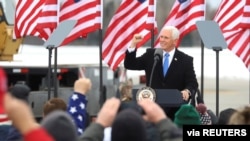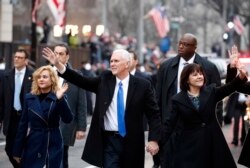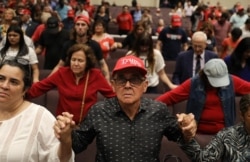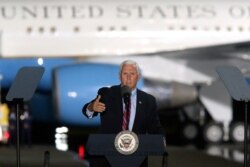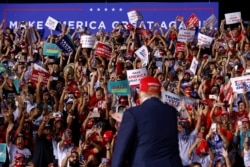U.S. Vice President Mike Pence carries a much higher profile into Election Day 2020 after nearly four years as a loyal champion of President Donald Trump and nine months as the head of the administration’s often criticized coronavirus response.
Pence was relatively unknown nationally four years ago when Trump, a first-time politician, picked him as his running mate. At the time, Pence was the governor of the Midwestern state of Indiana after a six-term stint as a congressman, a total of 16 years in which he built a solid conservative policy record but was facing a difficult re-election contest for another term as governor.
Trump, as much as anything at the time, needed Pence’s conservative credentials to bolster his underdog chances against Democrat Hillary Clinton. Pence, married to his schoolteacher wife, Karen, for 35 years, was the polar opposite of Trump, a brash New York real estate developer and reality TV show host on his third marriage.
Moreover, Pence had built an unparalleled link to evangelical Christians, an important mostly Republican bloc of conservative voters that might total a quarter of the U.S. electorate. In his upset 2016 victory, Trump won a huge portion of the evangelical vote, in no small part because of Pence’s place on the national Republican ticket.
Cementing relations with evangelicals
Since then, Trump has cemented his relations with evangelicals with his appointment of three conservatives to the Supreme Court and nearly 200 others to federal judgeships, as well as his vigorous opposition to abortion rights.
From his earliest days as a politician, Pence has described himself as "a Christian, a conservative and a Republican, in that order."
Pence’s closest adviser and confidant is his wife, Karen, whom he first met in 1983 in the parking lot of Indianapolis’s St. Thomas Aquinas Church. Karen, a teacher and accomplished watercolor artist, played the guitar there during Catholic mass although the couple later became evangelical Christians.
Pence and his wife exercise and pray together, according to media reports, and the vice president, according to reports in 2017, refuses to eat alone with women other than his wife.
Extraordinary loyalty to Trump
Pence has rarely skipped a chance to praise his boss, the president — and at one cabinet meeting in 2017, he offered 14 separate commendations for Trump, who was seated directly across the table.
However, in a rare criticism during the 2016 campaign, after a video emerged of Trump making lewd comments about women, Pence said, "I do not condone his remarks and cannot defend them."
Turning to Indiana politics
The 61-year-old Pence grew up in Indiana, earned a law degree and practiced as a lawyer for a while but soon turned to politics. He lost his first two contests for a seat in the House of Representatives in 1988 and 1990 but kept his voice and face before Indiana residents as a conservative radio and TV talk show host from 1994 to 1999.
Finally, in 2000, he won the first of six two-year terms in the House, where he compiled a staunch conservative voting record and climbed the Republican party leadership ladder. During one term, he was chairman of the Republican Study Committee, a group of conservative lawmakers, but he lost a contest to become the Republican minority leader at a time Democrats controlled the House. During his 12 years in the House, he introduced 90 bills and resolutions, but none of them became law.
Won the governorship
Pence won the Indiana governorship in 2012 and again amassed a conservative portfolio. He signed measures intended to restrict abortion and cut taxes, along with a law blocking local governments in the state from requiring businesses to pay wages and benefits to workers more than that required by federal law.
In an issue that drew national attention, Pence signed a measure called the Religious Freedom Restoration Act, which allowed individuals and companies to assert as a defense in legal proceedings that their exercise of religion was or was likely to be substantially burdened if they were required to treat all customers alike in commercial transactions. Conservatives in the state and elsewhere viewed the law as a way to contest the legalization of same-sex marriages.
But after vocal protests from moderate Republicans and businesses who said they would refuse to move to the state or expand existing operations, Pence retreated and amended the law to prohibit discrimination based on sexual orientation and gender identity.
Taking charge of coronavirus task force
As the coronavirus swept into the United States in early 2020, Trump handed Pence his biggest White House role, as overseer of the government's effort to curb the spread of the virus and coordinate its testing and treatment efforts while also initiating research to develop a vaccine.
Pence chaired meetings of the White House coronavirus task force and often updated the country on the status of the fight against the virus at daily nationally televised briefings. But Trump, facing a difficult re-election contest against Democratic challenger Joe Biden, soon took over the daily news conferences and often professed that the virus was under control, or soon would be, and that a vaccine would be developed before the end of 2020.
Adopting a rosier outlook
Pence also often adopted a rosier outlook on the state of the virus in the U.S., even as tens of thousands of Americans died.
At a time in June when the virus was surging in states and cities that had largely escaped the initial outbreak, Pence argued like Trump that the number of cases was rising because the country was doing more testing. In private meetings with Republican senators, he urged them to focus on "encouraging signs" in the country's battle against the virus.
In mid-June, Pence, in an opinion article in the Wall Street Journal, said panic over the coronavirus was "overblown."
"We've slowed the spread, we've cared for the most vulnerable, we've saved lives, and we've created a solid foundation for whatever challenges we may face in the future," he concluded. "That's a cause for celebration, not the media's fear mongering."
As Election Day neared and some Western nations implemented new shutdown orders to control their own spikes in infections, Pence promised in remarks to supporters that the U.S. strategy would focus on “opening up” and not “shutting down our economy.”
“We're going to keep moving heaven and earth to make sure our hospitals have all the supplies they need to get the level of care to anyone struggling with the coronavirus that we'd want a family member to have. We're going to keep protecting the vulnerable, particularly our seniors. We're going to keep saving lives and developing life-saving medicines,” Pence said.
Those remarks came days after Pence’s chief of staff, Marc Short, and several other aides tested positive for COVID-19. The vice president, as well as his wife, tested negative, and he continued to campaign around the country. The outbreak surrounding Pence also followed a larger one in which Trump, first lady Melania Trump, their son Barron and two dozen White House aides, staffers and allies were infected.
Pandemic not abated
Despite Pence's view, the surge of the pandemic has not abated. The death toll in the U.S. has now topped 230,000, according to Johns Hopkins University, and the number of confirmed cases totals 9.2 million, with both figures higher than in any other country.
The White House approach to the virus, which has included little use of masks by leaders, holding campaign events in which many attendees also did not wear masks, drew criticism from Democrats and from public health officials. Trump’s predecessor, former President Barack Obama, faulted the administration last week for being too slow and not aggressive enough.




